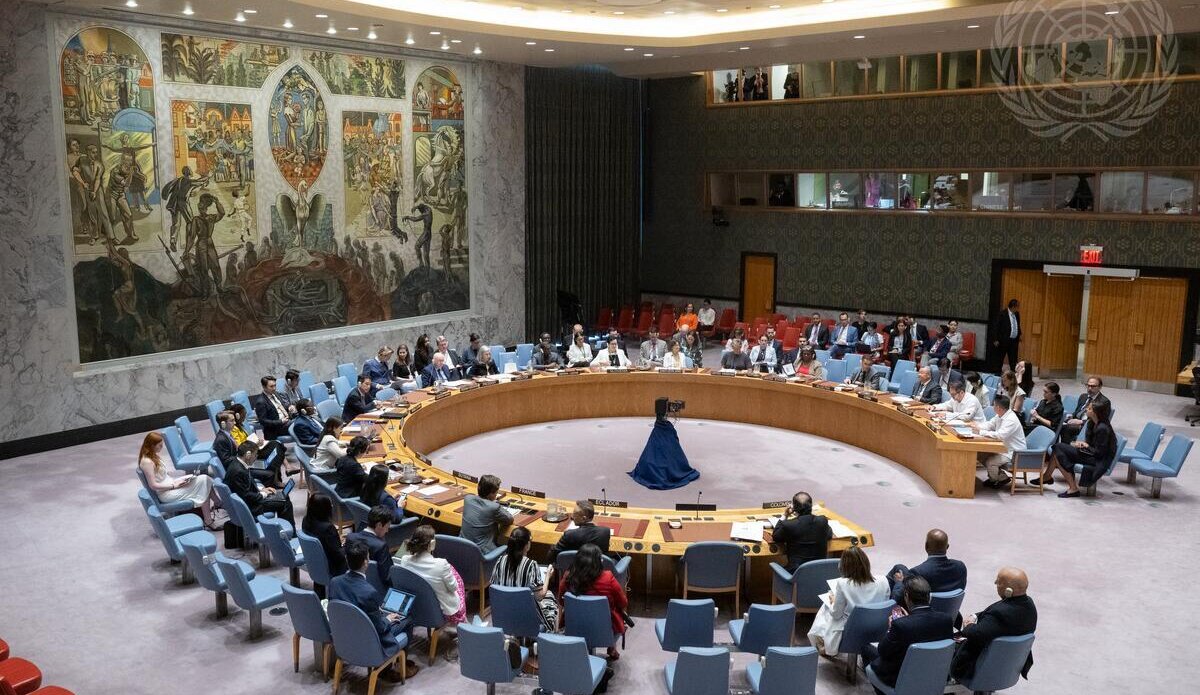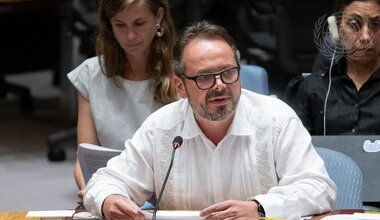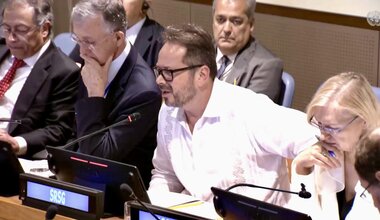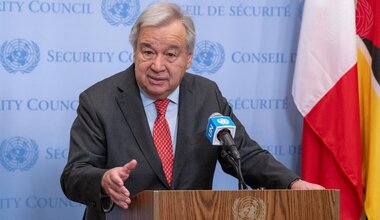Security Council Press Statement on Colombia following UNSC Colombia Session July 2024
Security Council Press Statement on Colombia following UNSC Colombia Session July 2024
New York, 18 July 2024. The members of the Security Council reiterated their full and unanimous support for the peace process in Colombia. They stressed the importance of ensuring the comprehensive implementation of the 2016 Final Peace Agreement and expressed appreciation to President Petro for participating in the Security Council meeting. They took note with interest of the announcement of the Government’s report on implementation of the 2016 Agreement.
The Council welcomed President Petro’s commitment to the 2016 Peace Agreement and stressed the importance of a coordinated effort to accelerate its implementation led by the Government with increased cooperation by all responsible actors and State entities. They welcomed the expanded cooperation between the parties to the Agreement, including their decision to establish a rapid action response plan to speed up its implementation. They took note of the participation of Diego Tovar representing the other high signatory party alongside the Government of Colombia during the Council session. They also welcomed the reinvigoration of peace coordination mechanisms including the Commission for the Follow-up, Promotion and Verification of the Final Agreement (CSIVI) and the decree setting up a “Peace Cabinet”. They emphasised the opportunity for this new Cabinet to accelerate implementation by defining and coordinating the roles, responsibilities, resources, and actions of all relevant Government entities. They also urged the continued use of other coordinating entities established through the 2016 Peace Agreement including the High Instance of Ethnic Communities and the Gender Commission.
The Council welcomed the commitment of the Government to bring peace to conflict affected territories. They stressed the importance of continued attention to the implementation of the rural reform provisions of the Peace Agreement which were key to addressing structural issues at the heart of the conflict. They welcomed President Petro’s commitment to rural reform and territorial transformation, including illicit crop substitution and urged the Government to redouble efforts to ensure the State’s presence in rural Colombia and stressed the need for development opportunities for communities and to support reintegration efforts including land access, housing, education and employment. They also welcomed the National Agrarian Reform System as an opportunity to deliver these objectives.
The Council reiterated their strong concern about the continued violence and insecurity affecting communities resulting in the killing of former combatants, Indigenous and social leaders including women and on environmental issues. They welcomed the approval in this context of the strategic security and protection plans for former FARC-EP members and looked forward to it delivering tangible results. They also welcomed coordination between the Ministry of Interior with Government entities and women’s organisations to finalise the second action plan of the “Comprehensive Programme for the Safeguards for Women Leaders and Human Rights Defenders”. They noted that this programme would offer an opportunity to address specific risks to women and their needs for protection. However, they noted with concern the possible forced relocation of a group of peace signatories living in the Miravalle TATR in Caquetá due to competition between armed groups.
The Council reiterated concern at the increase of violations committed against children in particular the recruitment and use of children by armed groups and sexual violence against children, noting that Indigenous and Afro-Colombian children were disproportionately impacted. The Council welcomed the continued commitment of the Government of Colombia to child protection and underscored its importance in peace talks.
The Council reiterated their strong concern that conflict-related violence, including conflict-related sexual violence, continued to have a disproportionate impact on women and girls and on Indigenous and Afro-Colombian communities. Council members expressed serious concern about the status of implementation of the Ethnic Chapter and called for greater efforts by the Government and all State entities to enhance its effective implementation and uphold the national pact to complete 60% of implementation by 2026.
The Council emphasised the critical role of the Special Jurisdiction for Peace (SJP) within the peace process, recognised its work to date, and looked forward to its first restorative sentences being issued. They recalled the responsibility of the Government of Colombia in support of this process to redouble its efforts to establish the conditions for the implementation of restorative sentences. They underlined the importance of prompt delivery by the SJP of justice in supporting the rights of the victims, and in defining the judicial situation of the peace signatories and those who have been submitted to its jurisdiction since its creation. They welcomed dialogue efforts, carried out with support from the Special Representative of the Secretary-General, Carlos Ruiz Massieu, to overcome differences between actors in the transitional justice process and trusted that this process would continue to focus on contributing to peace and reconciliation as outlined in the 2016 Agreement. They echoed the call from the Secretary General to “encourage all parties to show the necessary openness and willingness to reach solutions through dialogue”.
The Council reiterated that it looked forward to the timely publication of Colombia’s first National Action Plan for the implementation of UNSC resolution 1325 (2000) on Women, Peace, and Security (WPS) and hoped that this, along with other steps, would accelerate the implementation of the gender provisions of the Final Agreement and the WPS agenda in Colombia.
The Council underscored the Government of Colombia’s efforts to seek broader peace through dialogue and through the continued comprehensive implementation of the 2016 Agreement. They also stressed the importance of ceasefires representing a pathway to a peace process which reduced violence and alleviated the suffering of the civilian population, and reiterated the importance of strengthening civilian protection commitments. They highlighted the agreement reached on 25 May between the Government and the Ejército de Liberación Nacional (ELN) for the inclusion of civil society and trust that this will open a space for their full participation in the peace dialogues. The Council also encouraged the parties to continue to resolve differences at the peace table through dialogue and to focus on renewing and strengthening the ceasefire, including the return to prior commitments to protect the civilian population with a view to improve security in the territories. They took note of the Government’s announcement on 16 July that it had renewed the ceasefire for three months with several fronts of the so-called Estado Mayor Central (EMC) which have remained at the peace table and noted that the Government was continuing military operations against those fronts that had left the peace dialogue. They expressed hope for continued progress in dialogue including to further strengthen the ceasefire provisions with those that remained at the table and urged them to demonstrate continued commitment to peace.
The members of the Security Council reaffirmed their commitment to continue working closely with Colombia to support comprehensive implementation of the Final Peace Agreement as the primary pillar to secure broad and lasting peace and stability in Colombia and welcomed the continued commitment of both parties to this end. They also took note of President Petro’s participation at a meeting of the Peacebuilding Commission and underlined the utility of greater use of the Commission’s convening power and advisory role. They strongly supported the complementary efforts by the United Nations Verification Mission in Colombia, working in coordination with the United Nations Country Team.
***
 UN
UN




